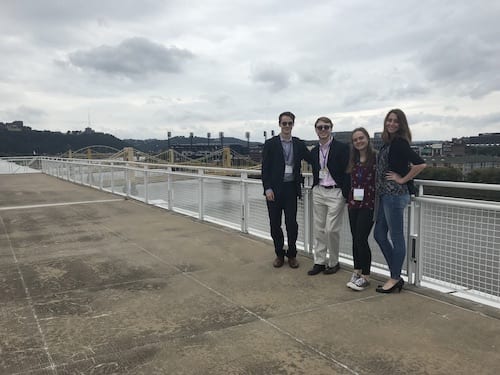Early this October, the 3rd annual Association for Advancement of Sustainability in Higher Education (AASHE) Conference took place in downtown Pittsburgh. Many of Chatham’s sustainability students were able to attend and learn about ways to improve the environment of campus life on Chatham and to share ideas with other sustainability students from across the country.
The Student Summit on Tuesday opened up with a keynote by environmental scientist and sustainable policy expert Garrett Blad, who had a hopeful take on the current state of environmental affairs. Focusing on the extent of the power young people have over climate change action, he encouraged attendees to stand up for sustainable policy in everyday life by living a more sustainable lifestyle and supporting sustainable brands. As the executive director for the advocacy group SustainUS, Garrett Blad certainly has the experience to back up his talk. SustainUS offers youth-led training sessions for organizations, schools, and universities to educate and empower youth. More on these training sessions can be found here.
The rest of the Student Summit was split into one hour long sessions led by the movers and shakers of sustainability movements across the country. Of the seminars attended by K-12 team member Morgan Block, one dealt with how Aramark, a food supply company for college campuses, is working to introduce more plant-based options at college dining halls. A diet that less meat-centered is better for the environment as growing vegetables requires less water and produces fewer carbon emissions than producing meat. An idea that Aramark and other universities came up with to promote a plant-based diet was “Meatless Mondays”, which failed on most campuses it was tried on, including Chatham. Not to be discouraged, Aramark found a way to reduce the amount of meat that needed to be prepared by simply arranging food courts so that students reached vegetarian options first, so they had less space for meat. This is a great example of working within limits that might be imposed on you by a budget, organization, or school culture to still make changes for a positive environmental impact. Aramark has a number of other sustainability programs in place for college campuses and K-12 school districts, which you can read about here. What sustainability initiatives do your food service provider have in place? How might students engage to help evaluate and enhance these initiatives?
Another seminar attended by one of Chatham’s sustainability students was titled “Sustaining our Communities Through Care and Action”, lead by Western Washington University Sustainable Action Fund Education Coordinator, Kate Rayner-Fried. This presentation was about how “community care principles”, such as outreach in disadvantaged communities, can be incorporated into sustainability thought, organizations, and actions. Rayner-Fried explained that the only way to have a truly successful movement, in sustainability or otherwise, was to share knowledge and to empower marginalized groups. Time was given to participants of this session to brainstorm ways to apply these ethics to our own organizations, whether they be professional or our school community.
To read more about AASHE and their mission, click here.
